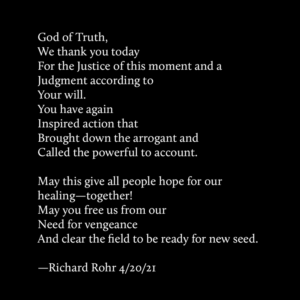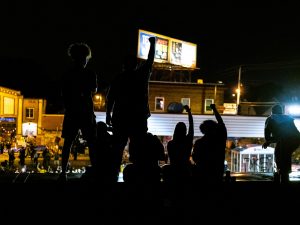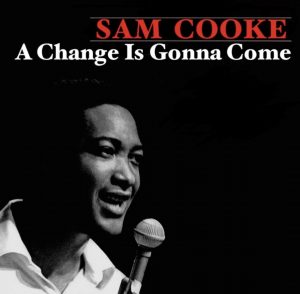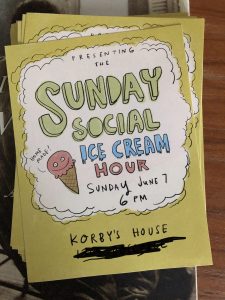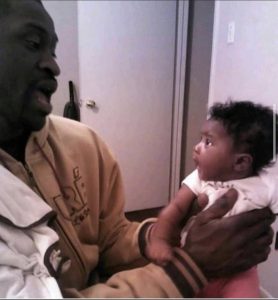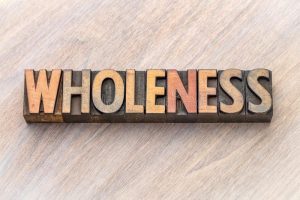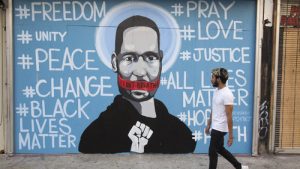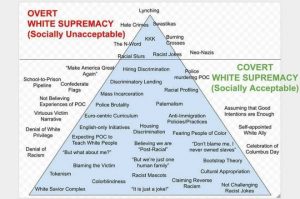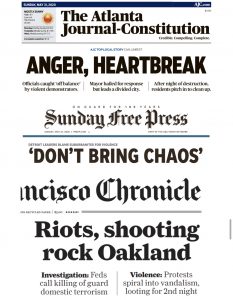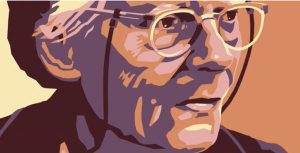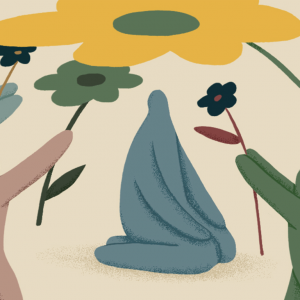George Floyd
Father Richard Rohr wrote this prayer yesterday after Minneapolis police officer Derek Chauvin was found guilty of the murder of George Floyd. Richard and the Daily Meditations editorial team invite you to pray these words, along with your own, as your contemplative practice today.
Center for Action and Contemplation
Albuquerque, New Mexico
Make a cup of tea…and listen.
April 20, 2021Resmaa Menakem (MSW, LICSW, SEP) teaches workshops on Cultural Somatics for audiences of African Americans, European Americans, and police officers. He is also a therapist in private practice, and a senior fellow at The Meadows. His New York Times best-selling book is My Grandmother’s Hands: Racialized Trauma and the Pathway to Mending Our Hearts and Bodies.
Resmaa Menakem
‘Notice the Rage; Notice the Silence’
Across the past year, and now as the murder trial of Derek Chauvin unfolds with Minneapolis in fresh pain and turmoil, we return again to the grounding insights of Resmaa Menakem. He is a Minneapolis-based therapist and trauma specialist who activates the wisdom of elders, and very new science, about how all of us carry in our bodies the history and traumas behind everything we collapse into the word “race.” We offer up his intelligence on changing ourselves at a cellular level — practices towards the transformed reality most of us long to inhabit.
Host Krista Tippett:
‘Across the past year, and now as the murder trial of Derek Chauvin unfolds, with Minneapolis in fresh pain and turmoil, I return again and again to the grounding insights of Resmaa Menakem. He is a Minneapolis-based therapist and trauma specialist who activates the wisdom of elders, and very new science, about how all of us carry in our bodies the history and traumas behind everything we collapse into the word “race.” We offer up Resmaa’s intelligence anew on changing ourselves at a cellular level — practices towards the transformed reality I believe most of us long to inhabit.’
More from Krista:
‘Ever after, when I use the word “we” or “us,” I understand in a whole new way that I do so in a White body … I hold that knowledge together with my clarity that when time becomes history, the generations for whom we are the ancestors will see an “us.”’
‘…enough of us are preparing to be the generation, in bodies of every color, after so many generations of betrayal & blindness, to step onto that long arc of the moral universe—bending it towards justice & the Beloved Community.”
Menakem:
‘When we’re talking about trauma, when we’re talking about historical trauma, intergenerational trauma, persistent institutional trauma — and personal traumas, whether that be childhood, adolescence, or adulthood — those things, when they are left constricted, you begin to be shaped around the constriction. And it is wordless. Time decontextualizes trauma. So when my grandmother is saying that, I need to pay attention to that. And for her, it’s decontextualized, so she doesn’t even have a context for it.
Bodies of culture. That’s right. And so one of the things that happens with the vagal nerve — there’s two. There’s the vagal nerve — I call that the soul nerve — and then there’s a muscle, the psoas muscle. That psoas is a beast, because the psoas, what it does is, it connects the top part of the body with the bottom part of the body. It also — if you’re braced, it also manages whether or not you mobilize or immobilize. And if you’re born to people who are already braced, you pick up in your psoas this kind of locking down, this kind of bracing, decontextualized.
And so what I’ve been talking to people about is, how do we begin to get the reps in with those pieces? So you’re gonna need time to condition your body to be able to deal with the aches, deal with the doubt, deal with all of that difficulty. You’re gonna have to get up against your own suffering’s edge, before the transformation happens. But you need to condition that. Why do we think that when we talk about race, that’s any different — for me to say, “We’re gonna have a white body supremacy talk; deal with the root of this stuff”?’
‘Rain without thunder and lightening…’
June 10, 2020The Atlantic
Why Minneapolis Was the Breaking Point
Black men and women are still dying across the country. The power that is American policing has conceded nothing.
Seventeen-year-old Darnella Frazier was on her way out the door to a Memorial Day bonfire on the other side of town when her 9-year-old cousin made a request: Would Frazier walk her to a nearby store? Of course, Frazier replied.
She and her cousin were on their way back home, at the corner of 38th and Chicago, just south of downtown, when Frazier spotted a distraught man sprawled on the pavement. A pile of police officers was holding him down. At least one of the cops seemed to be on top of the man’s neck.
Frazier pulled out her cellphone and hit Record.
Within hours, the whole world had seen the video: Minneapolis police officer Derek Chauvin driving his knee into the neck of 46-year-old George Floyd, not only until Floyd died but for minutes after his life had been extinguished. What came next was a national crisis.
When I first sat down to begin writing this story, parts of many American cities were on fire and police officers in dozens of places were committing indiscriminate acts of violence—unleashing tear gas, rubber bullets, and worse—against the citizenry they had sworn an oath to serve and protect. Elected officials were pleading for peace as parts of their cities burned and the nation, watching in real time on television, asked “Why?”
Decades earlier, there’d been the determined journalism of Ida B. Wells, whose Memphis newspaper was burned to the ground by white supremacists. Wells is best remembered for her crusading work in the 1890s, which not only documented the frequency of southern lynchings but also provided what we’d now consider data analysis in order to disprove the racist lie that lynchings were happening because black men had a particular lust for and inclination to rape white women. Less well known is that Wells also dispatched herself to the scene of cases of police violence, providing essential scrutiny of an equally American strand of homicidal impunity.
“Those who profess to favor freedom, and yet depreciate agitation, are men who want crops without plowing up the ground. They want the WESLEY LOWERY is a Pulitzer Prize–winning journalist and the author of They Can’t Kill Us All: Ferguson, Baltimore, and a New Era in America’s Racial Justice Movement. He is currently a correspondent for 60 in 6, a spin-off of 60 Minutes on the mobile app Quibi.” the former slave Frederick Douglass proclaimed in 1857. “They want the ocean without the awful roar of its many waters.”
“This struggle may be a moral one; or it may be a physical one; or it may be both moral and physical; but it must be a struggle,” Douglass continued, before arriving at a more widely quoted sentence: “Power concedes nothing without a demand.”
Racism is not to blame, the thinking popular among at least some conservatives goes. It’s the people fighting racism who are the problem. If everyone could just stop talking about all of this stuff, we could go “back” to being a peaceful, united country. No one seems to be able to answer when, precisely, in our history that previous moment of peace, justice, and racial harmony occurred.
WESLEY LOWERY is a Pulitzer Prize–winning journalist and the author of They Can’t Kill Us All: Ferguson, Baltimore, and a New Era in America’s Racial Justice Movement. He is currently a correspondent for 60 in 6, a spin-off of 60 Minutes on the mobile app Quibi.
[Full Article]
Tuesday, June 9th at 1 pm MDT
June 9, 2020Radio Boise will join 100+ community radio stations nationwide to play Sam Cooke’s “A Change Is Gonna Come” in commemoration of George Floyd’s life. Tune into 89.9 FM (Treasure Valley), 93.5 FM (Downtown Boise) or visit radioboise.org.
A note from Korby.
June 4, 2020Suspending my creative promotions for a moment.
The murder of George Floyd is something we can’t ignore. All of us feel that. If you watched the video of Mr. Floyd’s last moments on earth or even just saw that brutal, incendiary image of the officer’s knee crushing his neck, there is no looking away. The question has been forced.
The question: is it in any way acceptable for an officer of the law to kill a man — unarmed and handcuffed and pleading for mercy — in broad daylight with no provocation whatsoever?
The answer is no. It is not okay. In the name of the most basic definition of human decency, we demand justice for George Floyd.
But then there’s something more.
That photo. The white man’s knee, the black man’s gasp.
I can’t pretend to know what’s in your heart but I can look into my own. The question I keep asking myself is: to what degree am I complicit in George Floyd’s murder?
Sure I wasn’t there at the corner of Chicago Ave and East 38th in Minneapolis. But the fact remains that I am a benefactor, an inheritor of centuries of white privilege, white provision. The law purports Liberty and Justice for All, but even after two centuries of reform, the law is on my side first.
That officer’s knee was in my name. Me. The soft child of the American family, indulged and coddled.
A few freedoms I know and can name: I’m blind to most. I take for granted the world through which I move, as though it were my birthright.
But what would it be like not to have the whole system of justice and economic invention arranged like an armed phalanx behind you? What is it like to be black in America? I cannot know.
But I can listen.
That there are white folks like me awakening to the knowledge of not only our collective biases, but more importantly, the consequences of those biases, is perhaps cause for a quavering hope. It won’t give George Floyd his life back, or Breonna Taylor hers, or restore Ahmaud Arbery, Donnie Sanders, Tony McDade, or the extinguished lives of countless others. It might yield the imperfect consolation of justice. But what next?
What after?
The sense I’ve gotten from talking with my friends and family is that the spirit is willing, but the way forward is uncertain. It’s hard for an individual person, however well-meaning, to know what to do, where to start. I’m not sure whether a post, or a hundred posts, will add up to anything truly meaningful. I don’t know.
Change begins in the heart. Okay fine. But what does that mean? What does change actually look like? I can say any number of things to ally myself with people of color, but is that really a solution? Talk is cheap.
Voting change into office will help. Let’s get busy doing that.
But I’m looking for something personal. I think we all are. It’s not just about police brutality. It’s about wanting to be whole. Whole individuals. Whole people. A whole nation.
Well, what’s possible?
Let’s for once allow ourselves a wild hope. Let’s dare to concede the possibility that maybe, somewhere in the future there’s an integrated America, where Black Lives Matter, where the rights of each individual really are extended to all.
At the very least, maybe it’s possible to be a little more whole.
I’ve been quiet the last few days, mulling over this question. Reading a bunch of different perspectives. Trying to get my thoughts in order. Praying about it.
What would it look like to be a little more whole?
And this is where the death of George Floyd has shined a light in a dark corner of my own heart.
See, I live in a mixed neighborhood in East Nashville.
While its gentrification has been going on for more than fifteen years, I still have neighbors of color. Close neighbors. Two of the houses within a hundred feet of me are occupied by black families.
I have lived in this house for almost five years. I love living here.
But wait. Do I even know my black neighbors’ names?
No.
We have been living in parallel universes.
Worse, there are little kids in the family of one of those houses. What am I teaching them, by never saying hello when I see them playing in the yard? By them never seeing me talk to their parents?
I’m teaching them that white people don’t see them. They are invisible.
By the sheer act of being unneighborly to my literal neighbors, I’m participating in the furtherance of this no-longer-acceptable status quo.
There are other ways I, I know. But allow me to focus on this one for a second.
The question is, who is us? You draw a circle, everyone inside it is us. Great. But where is the boundary — the place where us ends and them begins? How big can we make the circle? I don’t know the answer to that question. But I think, where I live, I can expand my circle of us, even if just a little bit.
When I was a kid growing up in Twin Falls Idaho, it would sometimes happen on summer evenings that my dad would fire up the home made ice cream machine.
There is nothing as distinctive as the nasal whine of the buzzing motor cranking that frothy mixture of milk and sugar into something thick and sweet and frozen. The sound would fill us kids with anticipation. Shivers in our bellies.
Ours was a cheap unit and my dad would have to sit next to the machine on a chair and free up the motor with his hands when it would stall. After a half-hour or so he’d lift the frosty cold canister from the wooden bucket of rock salt and ice. Suddenly all the neighbor kids would magically appear in our driveway. My mom would hand out bowls and spoons and we’d eat our fill as fast as our mouths would let us. It was an unqualified joy.
So I’m going to try something. An experiment.
My friend Laura helped me make a few little handmade flyers. Yesterday I started handing them out to the people on my street — knocking on doors, inviting them to my house this coming Sunday, for an ice cream social.
Just, pop over for a bowl of homemade ice cream and say hello. Everyone welcome.
I have all kinds of neighbors. Young families, white folks, black folks, famous musicians, student renters, a couple people I’m pretty sure voted for Trump. All of us living right next to each other, basically never communicating beyond a wave from the sidewalk.
But what would it look like if we — for the time it takes to eat a little ice cream — act like the neighbors we are, for one hour, one time? I say let’s try it.
The Sunday Social Ice Cream Hour. Folks will come at 6. We’ll be done by 7:30 at the latest. Maybe a lot sooner if no one comes!
Either way I’m gonna do this again and again. I can be fairly relentless when I’ve made up my mind.
It might be amazing. It might be awkward. I don’t know!
The thing is, we have nothing to lose. It’s clear that doing what we’ve been doing is no longer acceptable. For me, change begins at seeing what’s in front of you. Seeing who’s in front of you. Just saying “Hey! What’s Up? Who are you?”
I’m not trying to claim this is the answer. But it might be an answer. To see if we can draw that circle a little bigger. White people living in mixed neighborhoods have a unique opportunity in this critical moment.
And that’s what I have felt these last few days: if not me, who?
Hey man, come over to my house. Bring your kids. Let’s hang out for a few minutes.
Maybe it’s a start. The invites are out. I’ll let you know how it goes.
I’m sorry Mr. Floyd. You didn’t die in vain. My prayer is that some small good can come of this. Maybe we can be a little more whole.
Korby is a writer/producer and singer/songwriter. He currently lives in Nashville.
George Floyd with his baby girl, Gianna.
A gofundme fundraising page has been created for Gianna.
https://www.gofundme.com/f/gianna-floyd-daughter-of-george-floyd-fund
From author Seth Godin:
“When a problem appears too large, too intractable and too unspeakable to deal with, it’s easy to give up.
There never seems to be enough time, enough resources or enough money to make the big problems go away.
Perhaps we can start with a very small part of it. One person, one opportunity, one connection.
Drip by drip, with commitment.”
How to be an ally.
June 1, 2020FCNL/Quakers
The Friends Committee on National Legislation
FCNL stands with protesters across the country. Advocates are calling for radical change because our institutions, poisoned by a legacy of racial oppression, have failed us. It will require work from every one of us–especially white people–to pave the way to a better future.
And we must make repeated calls for our government and leaders to do better. If you aren’t protesting yourself, hold protesters in the Light and ally yourself with impacted communities. Here are some ways to start:
THINK TWICE BEFORE SHARING VIOLENT VIDEOS
In an article for gal-dem, writer Kemi Alemoru discusses what should be done with videos of police brutality, questioning who these clips are for and whether they actually bring about justice. She writes: “We’re now in 2020, and black people already know about brutality and oppression. It’s this fact that forces the question of whether creating a spectacle out of black death is for black people, who are already familiar with the evils of racism, or whether it is to make white people see the white supremacy they ignore.”
On a platform like Twitter, where videos on your timeline autoplay, users are regularly faced with violent, disturbing footage that could damage their mental health – particularly when it shows someone being murdered. “Sharing violent, explicit, and exhausting images of George Floyd’s brutal death is not healthy for black people to see continually,” poet and activist Kai-Isaiah Jamal wrote on Instagram. “There is so much death, there is so much imagery of death. Please find alternative ways to share this story without the triggering video that is circulating.”
ONFRONT RACISM WHEN YOU SEE IT
In a chart shared by education organisation The Conscious Kid, examples of white supremacy are split into ‘overt’ and ‘covert’. At the top of the pyramid is lynching, hate crimes, and blackface, all of which are categorically unacceptable in society. Further down are examples including calling the police on black people – e.g. this week’s BBQ Becky: Amy Cooper – racial profiling, and ‘All Lives Matter’, which are all still regarded as socially acceptable. In order to change this, and ensure no racism is deemed OK, white people must confront one another about their privilege and enforcement of white supremacy.
As Dazed 100-er Marcelo Gutierrez wrote on Instagram: “To my white followers. It is your responsibility to engage and confront your white family and white friends. Have them question themselves. Hold their inaction accountable. Hold their ignorance accountable. Show them how to take action. Teach them how to begin to change their white community.”
TAKE ACTION
“Do more / something other / than re-sharing images of violence on my timeline challenge,” Travis Alabanza wrote on Twitter yesterday (May 27). Many have criticised the grim trend of simply sharing an image of a black person killed by police, along with a hashtag or empty sentiment, without actually taking action, nor – in the case of white people – addressing the systemic racism that benefits them and kills POCs. Instead, join Black Lives Matter protests – follow your local group on social media to find out when marches are planned – donate to funds that support people of colour, including this one in Minnesota, call your local politician – in the case of Floyd, contact Minneapolis’ mayor Jacob Frey. As Jamal continued on Instagram: “This is not another excuse for you to pretend like you stand with us, whilst filling up our online safe spaces reminding us of our current position in the world and our proximity to danger.”
ACKNOWLEDGE YOUR PRIVILEGE
In a post on Instagram, Munroe Bergdorf urged white people to reflect on their privilege at a time like this, and question how they could use this privilege to make change and educate others in their community. “We need to acknowledge that privilege exists as a spectrum and is an indicator for where the work needs to take place,” the model and activist wrote. “Expecting marginalised folk to be the ones to deconstruct their own oppression is as good as saying “not my problem” and letting it happen, as it doesn’t acknowledge where the problem is coming from. The definition of privilege is thinking that something isn’t a problem because it isn’t YOUR problem.”
PRACTICE SOCIAL DISTANCING
Earlier this month, it emerged that black people are four times as likely to die from coronavirus than white people. Based on this alone, to be a true ally – as gal-dem founder Liv Little rightly pointed out – you must practice social distancing during the pandemic (no matter what example the UK government is setting). As Little wrote on Instagram, accompanied by a chart showing the disproportionately high levels of Black Caribbean COVID-19 deaths: “If you aren’t practicing social distancing, you are truly selfish and there are no polite words to describe how I feel about you.”
If not now, when?
May 31, 2020‘Apocalypse (ἀποκάλυψις) is a Greek word meaning “revelation”, an unveiling or unfolding of things not previously known and which could not be known apart from the unveiling.’
‘Our nerves, our home, our country crave peace’…and leaders. As the helpers and heroes sustain us, I pray for shift. -dayle
Now, I have no choice but to see with your eyes,
so I am not alone,
so you are not alone.
-Yannis Ritsos
Mark Nepo:
There is a story of Gandhi that reveals how profound and daring his sense of compassion was. It occurred during one of his famous hunger strikes. A man whose daughter was killed came in anguish, saying to Gandhi that he would stop fighting if the great soul would eat. But Ghandi knew the healing was deeper than just stopping the violence, and so he told the man he would eat only when the tormented father embraced the man who killed his daughter.
It is said that the man collapsed in tears, but did as Gandhi asked, and the larger conflict ended. This is an enormous thing to ask of someone in grief, of someone who has been violated. But beyond the vast courage needed to incorporate this kind of love into our daily lives, Gandhi’s request reveals the irrefutable wisdom that only when the broken are headed, no matter what they have done, will we as a people heal.
-The Book of Awakening, p. 179.
Image credit: Dorothy Day, by Julie Lonneman.
’So what makes a good community? Our very survival as a faith tradition, not to mention a species, might just depend upon this.’
Common Ground & Purpose
People want something more from church than membership. They long for a spiritual home that connects with their whole life, not just somewhere to go on Sunday morning. Church is meant to be a place that nurtures and supports individuals along their full journey toward the ultimate goal: a lived experience of the communion of saints, a shared life together as one family, the Reign of God “on earth as it is in heaven” (Matthew 6:10).
Too often, the formal church has been unable to create any authentic practical community, especially over the last half-century. In response, we see the emergence of new faith communities seeking to return to this foundational definition of church. These may not look like our versions of traditional “church,” but they often exemplify the kinds of actual community that Jesus, Paul, and early Christians envisioned. People are gathering digitally and in person today through neighborhood associations, study groups, community gardens, social services, and volunteer groups. They’re seeking creative ways of coming together, nurturing connection, of healing and whole-making. The “invisible” church might be doing this just as much, if not more, than the visible one. The Holy Spirit is humble and seems to work best anonymously. I suspect that is why the Holy Spirit is often pictured as a simple bird or blowing wind that is here one minute and seemingly gone and then nowhere (John 3:8).
It’s all too easy to project unrealistic expectations on any community. No group can meet all our needs as individuals for emotional, mental, and physical well-being. The human psyche needs space and healthy boundaries and not co-dependent groupings. I certainly learned this lesson myself through my participation in the New Jerusalem Community in Cincinnati in the 1970s and 80s, and even earlier as a Franciscan brother. Almost any community can serve as an excellent school for growth, character, and conversion, even though it may not be a permanent “home” for many reasons.
Remember, the isolated individual is fragile and largely helpless to evoke long-term change or renewal. By ourselves, we can accomplish very little. We must find common ground and common purpose to move forward. Fr. Richard Rohr
‘We wake to our cities in pain but also in longing. Full of far more people ready to build & create than to tear apart. On Lake St in Minn yesterday I saw what the drones & news cameras do not convey – an alternative landscape of care rising up around devastation.’ -Krista Tippet, On Being
The NASA/SpaceX launch and ISS dock has brought needed respite, inspiration, and hope. Look what we can accomplish as a species when we work together. -dayle
Let us surrender to Divine Grace.
-Rev. Dr. David Ault

